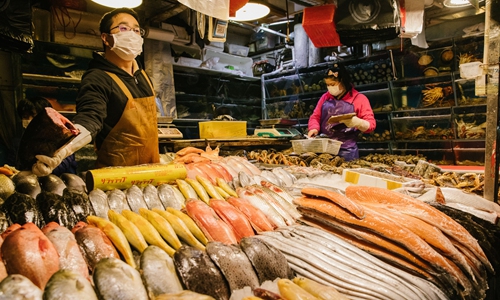Beijing city require tracing data of imported cold-chain food
By Zhang Dan Source: Global Times Published: 2020/10/26 20:25:43

A seafood vendor solicits customers in Beijing's Sanyuanli Market in February. Photo: Li Hao/GT
To strengthen supervision of imported cold-chain food that may carry COVID-19, Beijing city ordered all relevant companies to trace the sources, whereabouts of imported frozen food.
Beijing local authorities have ordered all relevant companies to trace the sources and whereabouts of frozen meat and seafood starting November 1, in a bid to strengthen supervision of imported cold-chain foods that may carry COVID-19.
On Monday, the Beijing bureau of market supervision and administration — together with the Beijing commerce bureau — launched an online platform called "Beijing cold-chain" to trace the movements of all imported frozen meat and seafood.
No local cold-chain food production or sales company should buy, sell or use imported frozen meat or seafood without traceable data, the announcement read.
Starting from November, Beijing customers will be able to scan the codes on imported cold-chain food or codes provided by relevant sellers, via Chinese apps WeChat or Alipay, to check the source of cold-chain foods.
After hearing the news, a Beijing-based seafood importer who preferred to remain anonymous told the Global Times that it is very hard to trace all imported seafood due to the large volume involved.
In 2019, China imported 4.84 million tons of meat, up 58 percent, and 6.265 million tons of seafood, up 19.9 percent, Chinese customs revealed in September.
However, Qin Chao, CEO of professional catering publication China Restaurants Insider, told the Global Times that tracking the movement of imported frozen meat and seafood is feasible as imported frozen food usually has traceable data, inspection bills and direct flow records.
"Some food processing companies in China have been doing this in recent years as a measure to ensure food safety. Under the COVID-19 pandemic, Beijing's requirement will promote the traceability of imported cold-chain food," Qin noted.
The move, though hailed by Fan Xubing, president of seafood importer Beijing Seabridge Marketing, may increase labor costs and cause delivery delays in the short term.
"I am all for the new requirement of the Beijing government. Traders have already had the bills, customs declarations, inspection certificates and quarantine documents in their hands. Now, we just need to upload them online," Fan told the Global Times, expressing concern about additional labor costs and data-input errors.
"In the short term, the additional time needed to input traceable data may slow the transportation of food, which may result in some market shortages and rising prices," Qin warned.
After the COVID-19 was detected in imported frozen food or on its packaging multiple times in China, the country ramped up efforts to ensure the virus does not spread through cold chains, as it can survive for prolonged periods in a frozen environment.
Qin Yuming, secretary-general of the Cold Chain Logistics Committee from China Federation of Logistics & Purchasing, told the Global Times that the biggest difficulty of finding the sources of virus in cases relevant to cold-chain lies in failure to "track the food all the way."
"The full life circle of cold-chain products involves production, processing, packaging, handling, transporting, storage, display and selling. Improving the digital tracking during logistics is important to secure the safety of cold-chain products," Qin said.
Posted in: INDUSTRIES,COMPANIES